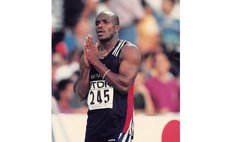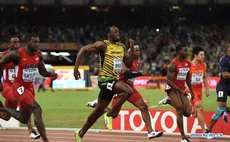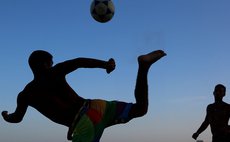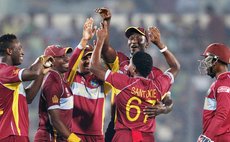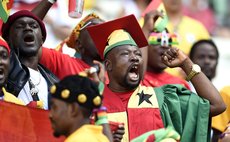Sober reflections from Brazil - 2014
Most frequently admitted summation coming from World Cup 2014 is the view that Germany deserved to win the championship. Much of this is urged by Brazil's 7-1 demolition by the new champions. Resting at the core of Germany's success has been a strong reliance, not on one player or two such outstanding figures, but on the unimpeachable solidity of the team as a unit. Anyone of five to seven ace quality operators could be relied upon to do the job that was needed – winning the foremost trophy in sport.
Apart from their blowout of Brazil and a portentous signal revealed against Portugal in the 4-nil curtain raiser in Group "G" Germany did not have it as plain sailing all the way. They had to pull out all the stops to gain a 2-2 equalizer in the 71st minute against Ghana, and could have counted themselves fortunate to obtain a draw in what I considered a sensational match in which the Ghanaians' defender might and main but often fell victim to impetuosity.
From a slender assurance of four points, Germany needed only a draw against USA. Yet, it was not before the 56th minute Thomas Muller was able to finally defuse the heroics of custodian Tim Howard whose agility marked him as a one man foil to incessant bombardment thrown at him for more than forty minutes.
The round of sixteen proved no less arduous. Algeria, of only two surviving African countries was bent on causing an upset. They kept the score goalless, forcing extra time. However, German method structure procured two goals by the 105th minute and even then the Algerians came off with a last gasp consolation goal. The Algerians can look back on the tournament and say they last only 2-1 to the eventual champions in an exhausting affair.
There was no relenting of the work pressure in the quarter final against France. Many assert it was only the relatively poor finishing of France which prevented a vastly different outcome. Hummel's header in the 16th –minute in culmination to a superbly well delivered free kick secured the 1-nil lifeline to the semi-final.
Much as Brazil's defense had not been given more than a grudgingly ordinary pass mark up to that stage; no prophet of doom was wildly prone to forecast the 7-1 bomblast they were to see inflicted by Germany. It was not so much a dress rehearsal. As these things go, it was a danger warning of how carelessness in defense could lead to utter catastrophe. What then could the effect of this be upon opponents Argentina in the final?
The Argentines came in with a not to be ignored work ethic: 2-1 over Bosnia- Hezegorine, 1-0 over Iran and 3-2 against Nigeria in a troublesome encounter requiring Lionel Messi to approach his topmost capabilities.
It turned out to be an uphill battle in the round of 16 requiring extra time to dispose of Switzerland 1-nil. Argentina did not leave it late, though, in dealing with the Belgian threat at Brasilia. A well struck instant shot by Higuain put the matter beyond doubt in the 8th minute. Argentina is one of the most implacable defenders of a 1-nil lead. Thus to the semi-final in which neither the Netherlands nor themselves managed to break the deadlock in open play or in extra time.
In the penalty shootout Argentina held their nerve superbly but Netherlands, missing two of their four spot kicks. Whatever the regrets there, Pallacio had earlier failed to deposit a header from a face to face position with the Dutch keeper. This could have settled the issue in extra time.
With their much heralded accent on defense, it was little surprise that Argentina, in the word of Chelsea manager Jose Maurinho, simply "parked the bus in front of their goal." And with far more of the 68,000 at the Marcarana Stadium supporting them, there was going to be nothing like the open door policy Brazil had offered to the Germans in the outrageous 7-1 saga that shook the world.
Extreme caution was absolutely well personified in the opening ten minutes of the final and it took that long before Argentina managed to mount an attack of more than three passes strung together coherently. Higuain did get the ball in the net at the 20th minute but from an undoubted off-side position. However, Germany could be regarded as the more assured team.
Stalemate followed stalemate only to see the deadlock broken in the 112th minute with one of the most memorable goals of the tournament. Klose made the run in from the left and the substitute Mario Gotze chested the short corss to volley past a thoroughly well beaten Argentinian keeper.
Argentina had gone behind for the first time and that's where the score remained 1-0, and Germany exulted as the first European country to capture the World Cup in the New World. Fittingly, the German dressing now was visited by German Chancellor Angelo Markel. Not only in her specific position as head of state but a personality closely related to the footballers as professionals.
Considerations about the World Cup linger on as to how much it meant to the various participants from the national point of view. England, Spain, Portugal and Italy were washed out early and they need not just to return to the drawing board. They may have to build new drawing board. The African countries acquitted themselves well, perhaps better than had been expected. Cameroon, Ivory Coast, Algeria, Nigeria and Ghana somewhat established themselves as solid emerging forces.
CONCACAF did not fail to do itself justice. Mexico is indeed a global powerhouse and Costa Rica definitely is getting there. Honduras didn't quite make it but the USA displayed quality of heart which promises much for the future.
When asked, the Germans asserted the value of great team spirit behind their success. There was no complaining by members of their squad who did not kick a ball in any of the matches. And it was culmination of a decade or more of well thought out national programmes that contributed to Germany's triumph. Significantly their technical experts are already looking at areas in which the team needs to improve. Bear in mind it is a relatively young team. The goal scorer in the final is still only 22 years old.
